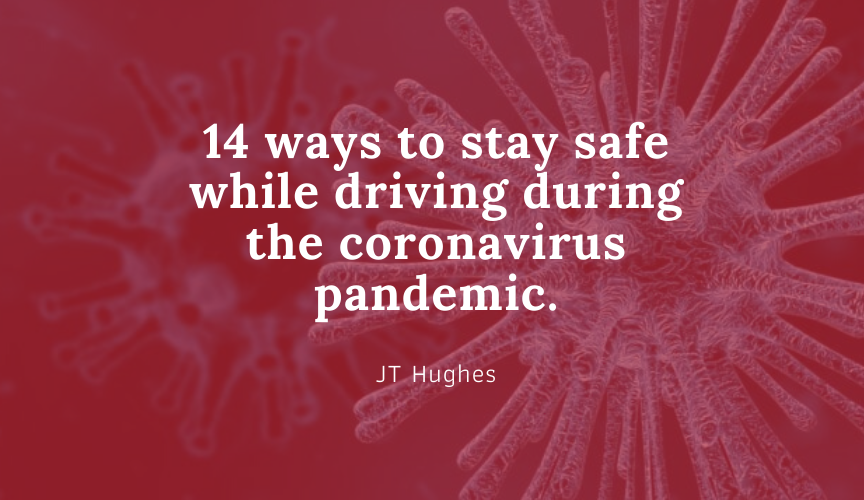https://www.jthughes.co.uk/Blog/View/14-ways-to-stay-safe-while-driving-during-the-coronavirus-pandemic/12272
14 ways to stay safe while driving during the coronavirus pandemic
Disclaimer: JT Hughes encourages opinion in the comments section below or their Facebook page but please be respectful. Offensive language is not acceptable and will be deleted. JT Hughes makes no representations as to the accuracy or completeness of any information on this article or found by following any link within the article.

As we approach the month of May, the coronavirus pandemic has already taken the lives of over 20,000 people in the UK alone. Emergency legislation has been put in place to protect the most vulnerable – but no matter how much we isolate, sometimes staying home simply isn’t an option.
Many of us still need to drive to travel to essential jobs, to purchase food and to collect medication. While there’s no way to completely eliminate risk, the following tips could help you to stay safe while driving during the grip of COVID-19:
1) Limit the places you drive to
The more places you visit, the higher your chances of interacting with someone infected with the coronavirus. By sticking to essential journeys in Shropshire, you’ll reduce the risk of bringing the virus into your car.
Ads by JT Hughes
Scroll to continue with content
2) Filling up? Be wary of what you touch
Studies have suggested that fuel pumps could carry up to 11,000 times the germs found on the average toilet seat. When handling fuel pumps, you should wear gloves if possible, and use contactless methods of payment where permitted.
3) Limit your amount of passengers
The risk of exposure to pathogens (including COVID-19) increases if you’re routinely picking up passengers. However, if you’re merely driving around with members of your household, this won’t be a huge issue. Where possible, you should limit yourself to one passenger at a time – and they should keep their distance by sitting in the back seat.
4) Sanitise your hands frequently
Frequent hand washing and sanitation is crucial in all areas of life. To avoid spreading the coronavirus in your car, you should regularly sanitise your hands before and after any car journeys.
5) Disinfect high-touch areas of your vehicle
Interior door handles, gear sticks, seatbelts, car radios and steering wheels are all contamination hotspots. These should be disinfected regularly.
6) Keep your dashboard clutter-free
Hot air is regularly circulated over the dashboard of your vehicle. Try to avoid keeping clutter on the dashboard area, as this can create a breeding ground for pathogens.
7) Consider what you’re transporting
Anytime you bring an object (such as groceries or laundry) into your vehicle, there’s also a risk that you’re bringing the coronavirus in too. Something as simple as slamming a car door in a breeze could cause virus particles to become airborne, so you should try your best to disinfect high-impact zones such as the car boot.
8) Air your vehicle out
Studies have suggested that COVID-19 can survive in the air for up to three hours. Leaving your car windows open can help to air it out, and this will reduce any risk of contracting the virus within your vehicle.
9) Educate your fellow car users
If multiple drivers are using the same vehicle as you, you should ensure that they know how to disinfect high-touch surfaces before and after use.
10) Clean with soap before disinfecting
Eliminating traces of the coronavirus involves more than simply using a disinfectant. COVID-19 particles are adept at making a home in dirt, dust and oil, so you’ll want to make an effort to remove contaminants as well as disinfecting your vehicle
11) Store disinfectant wipes in your car
Disinfecting wipes are more adept at killing pathogens than sprays or liquids, as they allow for the disinfectant to sit on contaminated surfaces for prolonged periods. This “dwell time” is essential when it comes to properly killing germs. If you have to use sprays, allow them to soak into the surfaces of your vehicle long enough to take effect.
12) Use products that won’t harm your car interior
Some bleach-based disinfectants could damage your dashboard. If you’re dealing with a high-end vehicle or disinfecting materials like supple leather, you should take care not to cause any lasting damage. Consider testing a product on a small area of the interior before opting for a deep-clean.
13) Avoid car-sharing
Even if you’re a key worker, you should avoid car share schemes at this moment in time. If car-sharing is unavoidable, remember to use hand sanitiser before and after any journeys, and don’t touch your face before doing so.
14) Follow the latest government guidelines
COVID-19 is a new virus, and there’s a lot we don’t know about it. It’s therefore important to keep up to date with the latest guidelines on combating its spread. You can do this by paying attention to the latest government announcements.